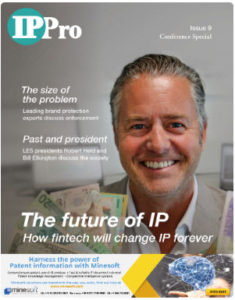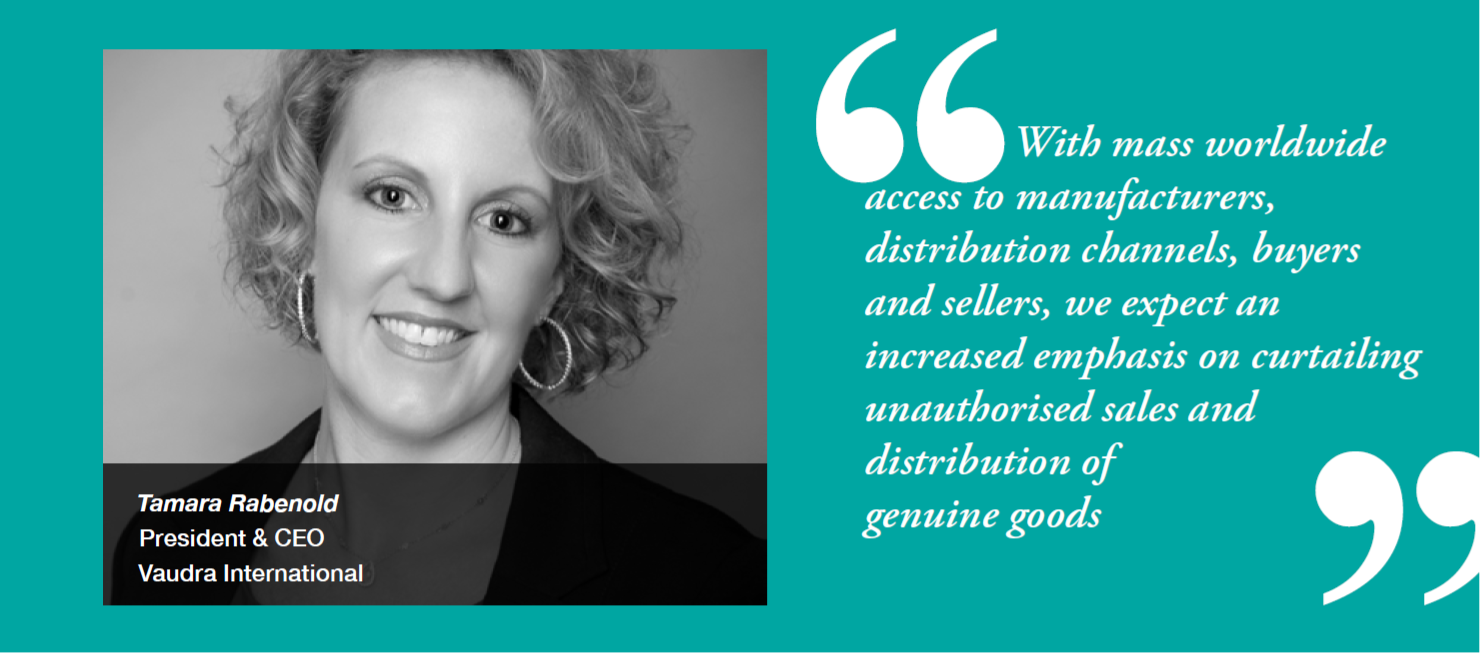
Tamara Rabenold, president and CEO of international intellectual property investigations company Vaudra International, explains how she found her passion for IP investigations
Ben Wodecki reports:
How did Vaudra International come about and how did you begin your career in IP investigations?
My husband, Randy Rabenold, was in the US Secret Service for several years before leaving to pursue an opportunity in an unrelated field. In the early 1990s, he was ready to return to his investigation and security roots, landing a position at an intellectual property investigation firm in Charlotte, called Colt Investigations.
At that time, Colt Investigations was one of the first to incorporate tactics commonly used by law enforcement agencies in undercover drug deals for counterfeit product investigations. He excelled as an investigator and client manager, working at a couple intellectual property investigation firms, before starting his own, Vaudra International, with his business partner Howard Dozier in 2003.
I learned about the IP industry and Vaudra International when Randy and Howard opened their office across the hall from the marketing agency where I worked. Over the following year, I helped them by developing their new logo and website. I was enthralled with their success stories and careers as IP investigators. Somewhere along that road, Howard asked if I’d be interested in interviewing for an investigator position and I jumped at the opportunity.
Now, nearly 15 years later with my own investigative career, I look back and marvel at how lucky I was to be in the right place at the right time. In the process, I also managed to find love. There were times that clients thought we were an item long before it was a reality, as it tends to be rather common for husband and wife teams to operate investigation companies. Randy and I were married in late 2015. Through the years in expanding our network of investigative contacts, it is remarkable to see so many couples working alongside each other within the industry.
Tell us about some of the investigations you’ve undertaken, what are your best moments?
The best moments are when you achieve that big win for a client. We recently added several case studies to our website to illustrate a few examples.
I’ll never forget my very first win back in mid-2004, which originated from an investigation into counterfeit goods being offered on eBay by a Chinese seller. Through undercover dialog with the subject, I purchased an evidential sample for the brand to verify authenticity, and then persuaded the counterfeiter to allow for ‘my agent’ to meet at the factory.
I coordinated with our local asset to meet with the subject and travel with him to the factory. As a result of that visit and what transpired, a complaint was filed against the factory the following day, and a raid was conducted with the local Chinese authorities, which saw the seizure of over 1,000 counterfeit finished garments, sewing machines, and more. From start to finish, this case was completed within a month’s time.
There have been so many changes in the way of the world, investigation process and mentality of the counterfeiter since then. It is a constant evolution to develop new strategies and tactics to achieve these types of results.
What have been the most noticeable trends in the past few years?
Domain names are a hot commodity. When was the last time a company said that they don’t have a website? We have completed more anonymous domain acquisitions in 2018 than in the past two years combined.
Whether rebranding the company, preparing for a new product launch or expanding business to a new country, companies have recognized the increased need for the associated domain name and understand the benefit of hiring experts to facilitate the process. While a variety of factors play into any IP acquisition, we have a 75 percent success rate of obtaining the target domain. We have acquired domains across more than 25 gTLDs and ccTLDs.
There was concern that the EU’s General Data Protection Regulation would restricting access to WHOIs information, but we have not found the implementation of these regulations to be a significant hindrance at this point.
Another trend, while not new but continuing increase, is the use of social media platforms to promote and sell counterfeit products. It seems that as many brand owners and ecommerce platforms become more vigilant in policing for fakes, the sellers resort to social media to sustain and grow their business.
It’s a smart move for the counterfeiter when you consider that the potential audience: Facebook hit 2.27 billion monthly active users as of Q3 2018, as compared to the much smaller buyer pool of eBay, which has 177 million users as of Q3 2018, and Amazon with 310 million users as of their last reported period.
Add to that the fact that like-minded users congregate on social media sites like Facebook by creating groups, liking posts and just being friends.
It is much easier to target the preferred audience too, even if there may be more content with which to compete.
What is the impact of current legislation on your role? Is there anything that could be changed to make your role easier?
Other than the possible exception of loitering, a private investigator license does not give us any additional power or authority over a regular citizen. Privacy legislation at the state and federal level, in addition to Gramm-Leach-Bliley Act (GLBA) that protects financial information, and Driver’s Privacy Protection Act (DPPA), is at the heart of our industry.
These regulations define and structure the legal confines of our profession, which we understand and respect. To this day, some of our clients are surprised when we state that we can’t obtain bank account numbers or account balances (GLBA).
When we consider jumping into a subject’s trash or subcontracting a resource out of state (or country) to do so, we must be aware of current related laws.
I remember discussing this information gathering method with a California private investigator. Because of privacy laws, the investigator takes a photograph of the dumpster prior to recovering any refuse to refute a claim that they opened a locked dumpster.
New Zealand law does not permit retrieval of someone else’s trash. A resourceful Kiwi investigator circumvented this law by photographing the documents while inside the garbage can!
As for pinging someone’s cell phone, we won’t do it. If you have to debate whether a practice is legal and ethical, in most instances it is not.
What would make our role easier? If you are granting wishes, give us subpoena power to obtain utility, telephone, financial and credit card records!
That’s investigator gold at the end of a rainbow. Otherwise, create a magic pill that keeps private investigators updated on state and federal legislation impacting our job. We certainly aren’t the only profession that could use it.
Until such wizardry is available, we rely on information obtained from state, federal, and industry-related associations.
This year, I was honored to serve as President of the North Carolina Association of Private Investigators. One aspect of serving our membership in this capacity is staying abreast of changes in our state’s legislature and raising questions when new regulations emerge, or existing ones need clarification as our profession continues to evolve.
The IP world is constantly changing. What is the next big thing for IP investigations?
Tough question. Since we are essentially guns for hire, the next big area for investigations will be largely sculpted by shifting priorities of IP owners, brands and their counsel as they work to protect the value of their IPR. What is important to them? What has the greatest impact on their bottom line? What are the loudest complaints from the shareholders and sales team?
With the surge of ecommerce and consumers buying more online, shipping/freight services and the related infrastructure will be critical. Just look at Amazon’s fleet of delivery drivers to satisfy the ‘Prime-al’ desire to have packages delivered on weekends (including Sunday). New distribution centers are popping up everywhere, along with countless Amazon tractor trailers on our highways.
With increased shipping volume, we expect a rise in fraudulent returns and other logistics schemes. One common example is a consumer returning an item for a refund, but sends back a counterfeit version instead. Then, they re-sell their original purchase, the genuine item, for a profit. Where did the consumer get the counterfeit? Where in the return process will the fake be recognized and how does the brand (or third-party distributor) handle it? The solution to this problem may come out of anti-counterfeiting budgets for some companies.
With mass worldwide access to manufacturers, distribution channels, buyers and sellers, we expect an increased emphasis on curtailing unauthorized sales and distribution of genuine goods. To protect profit margins in such a competitive marketplace, preserving the sanctity of the supply chain is a critical area for increased scrutiny (whether the goods are actually real or fake).
Investigations will play a role, but as another component to address this, we expect that more brands will implement datacentric authentication and tracking security features into their products and packaging. If brands wield this technology, every smartphone has the potential to become an authentication tool, giving the end user the ability to scan and verify the authenticity of the product. This is just the beginning. Imagine that the scanned mark has geolocation capabilities as well as the potential to open a two-way communication channel for consumer engagement.
This technology is a reality and gives brands the unique opportunity to bridge gaps between security, authentication, marketing and consumer education. Cross-functional solutions and sharing data are imperative in a world that moves so rapidly. There’s an app for that!
To this point, historically speaking, anti-counterfeiting departments that use private investigators have done so autonomously, without comingling agencies. One of our clients recently scheduled a conference call that included the primary investigation companies that they use in each region across the US.
The client understands the interconnectedness of it all as investigations bleed into other regions of the country (and overseas), thanks largely to the power of the web and transshipments. With a team, management style, the client harnesses the value of collaboration to the benefit of the brand.

CLICK HERE to see the original article as it appeared in Issue 9 (Conference Special) of IP Pro magazine.



